A Descriptive Survey Study of Patient Needs and Preferences for Cancer Pain Self-Management Support
Objectives: To characterize the needs and preferences for pain self-management support (SMS) among patients with cancer during the transition of cancer care from the hospital to the home setting.
Sample & Setting: 38 participants with cancer pain at a research-intensive cancer center in New England.
Methods & Variables: A descriptive, cross-sectional survey study was conducted to investigate relationships among preferred and received support, extent and management of transitional change, and pain outcomes. Pain intensity and interference were measured using the Brief Pain Inventory–Short Form, transitional change was measured using the Measurement of Transitions in Cancer Scale, and SMS was measured using dichotomous questions.
Results: About half of participants reported concordance between preferred and received cancer pain SMS in the hospital and at home. The extent of transitional change in cancer care was found to be a significant predictor of average pain intensity in the hospital and pain interference at home. Satisfaction with cancer pain SMS was a significant predictor of pain intensity at home.
Implications for Nursing: The extent of change during care transitions should be considered when fulfilling patient needs and preferences for cancer pain SMS to optimize outcomes.
Jump to a section
Cancer pain, which can occur because of the cancer itself and/or its treatment, is reported by patients as one of the most distressing symptoms throughout survivorship. A study by van den Beuken-van Everdingen et al. (2016) indicated that the prevalence of undertreated cancer pain is 40% after treatment, 50% during treatment, 66% in advanced disease, and 51% in all phases, with a 38% prevalence of moderate to severe pain that persists despite clinical guidelines, interventions, and pain medications. Factors of undertreated cancer pain are complicated and include the healthcare system, providers, and patients (Scarborough & Smith, 2018). Readmission rates as high as 25% are common among adults with advanced cancer who report uncontrolled pain (Solomon et al., 2019). Kötzsch et al. (2015) found that 40% of participants reported problems with coordination of care when transitioning from the hospital to home. Higher readmission rates among those discharged home with help also suggest that the current process of transitioning care to home may not be addressing patient health needs sufficiently. Transitions in cancer care, whether because of changes in treatment, disease status, or setting (Chick & Meleis, 1986), can influence how patients manage their cancer pain. Because undertreated pain is one of the primary reasons for hospital readmissions, appropriate treatment of pain could reduce individual and economic burdens related to readmissions, improve pain outcomes, and increase quality of life (Sinatra, 2010).
Pain self-management is an important part of treatment because cancer pain occurs most often in the home setting. Cancer pain self-management is designed to facilitate improvement in pain outcomes; however, little is known regarding patient needs and preferences for cancer pain self-management support (SMS) during transitions in care. Different types of SMS may be required to manage patients’ pain outside of healthcare settings based on their specific needs, preferences, and values. Understanding the process of pain self-management during transitions in cancer care is crucial for healthcare providers (HCPs) when implementing pain SMS interventions and assessing the effects on cancer pain outcomes (Trappenburg et al., 2013; Yamanaka, 2018). Greater understanding of patients’ perspectives can inform future implementation strategies and identify practical challenges experienced by patients when contemplating and applying such pain management interventions.
Previous evaluations of cancer pain self-management interventions have found that patients perceive inadequate informational support and a mismatch between their specific needs and preferences for pain SMS (ElMokhallalati et al., 2018; Gao & Yuan, 2011). Educational interventions have been shown to improve patient knowledge and self-efficacy, but the components may be more effective in reducing perceived pain and its effect on functional status (pain interference) if they align with the patient’s needs, preferences, and values (Greco et al., 2014; Jahn et al., 2014; Koller et al., 2012, 2013; Kravitz et al., 2011).
Although one study identified patient preferences for analgesic treatment support for cancer pain (Meghani et al., 2013), to date, no studies have specifically examined cancer pain SMS needs and preferences during transitions in cancer care from the hospital to the home. Pain management, patient education, and symptom self-management are not new concepts, but pain is still a major reason for hospital readmissions. The purpose of this study was to understand the influence of transitioning (care and disease process) from the hospital to the home and to evaluate whether current processes provide adequate SMS to patients experiencing cancer-related pain.
Theoretical Framework
This study was based on integration of the revised self- and family management framework (Grey et al., 2015) and transition theory (Meleis, 2010). This theoretical approach provided an innovative way to evaluate the process of pain SMS in the context of health, illness, and cancer care transitions; pain level and interference; and quality-of-life outcomes. A central tenet is the critical role of positive psychosocial support for increasing patients’ knowledge of care options and improving overall symptom management (Grey et al., 2015).
Concepts
According to the International Association for the Study of Pain, pain is defined as “an unpleasant sensory and emotional experience associated with, or resembling that associated with, actual or potential tissue damage” (Raja et al., 2020, p. 1,976). Pain management involves pharmacologic, nonpharmacologic, and other strategies that prevent, alleviate, or stop pain sensations. Self-management is an ongoing dynamic interaction with overlapping processes, tasks, and skills that change over time and, thereby, affect the patient’s ability to carry out pain self-management behaviors (Grey et al., 2015). Pain self-management refers to the patient’s ability to manage pain with cognitive and behavioral strategies (Devan et al., 2018).
Cancer pain self-management involves knowledge, skills, and psychosocial, relational, and informational support to carry out health behaviors (Jacobsen et al., 2014). Transitions in care can be a catalyst for adverse events (Naylor et al., 2011), which may complicate the process of pain self-management. The concept of transition contains elements of process, timespan, and perception (Chick & Meleis, 1986). Transitions are stages between one life phase, condition, or status to another. Movement between different care settings is a common transition of care, and a frequent transition is from the hospital to the community (Saunders et al., 2019). Schulman-Green et al. (2017) identified seven additional transition areas in cancer care: physical, social, emotional, spiritual, cancer care status, treatment, and transition approach. Transitions are important because patients prefer to receive care in their homes (Scott et al., 2020). Receiving SMS that is consistent with their needs and preferences may result in smoother transition processes and less pain for patients.
Although cancer pain self-management programs have been developed and refined over time, SMS and transition-related outcomes have continued to be understudied (Devan et al., 2018). Without fully understanding the relationships among needs and preferences for pain SMS during transitions in cancer care and pain outcomes, there remains a missed opportunity to improve pain management and possibly reduce readmission rates because of uncontrolled pain. Advancing this knowledge will help to create interventions addressing the unmet needs of patients with cancer and improve oncology nurses’ skills to support patients’ pain management experiences. The research questions of this study were as follows:
• What cancer pain SMS do patients prefer and need?
• Are there relationships among support preferences and pain outcomes during transitions of care?
Cancer pain varies during the cancer care trajectory from diagnosis and treatment to long-term survivorship. Although positive and negative psychosocial support can influence cancer pain self-management, patient needs and preferences for SMS may change throughout the trajectory of cancer care (Schulman-Green et al., 2017). When SMS is aligned with patient needs and preferences, the anticipated outcomes are effective cancer pain self-management behaviors and lower perceived pain. Advancing knowledge of cancer pain SMS requires better understanding patient needs and preferences during transitions in cancer care.
Because positive psychosocial support plays a critical role and is a key part of pain SMS systems, a descriptive cross-sectional study was designed to characterize the needs and preferences for pain SMS among patients with cancer during the transition in cancer care from the healthcare setting to the home, as well as their influence on transition-related outcomes. The specific aims of the study were to: (a) characterize cancer pain SMS needs and preferences, support received, extent and management of transitional change, and pain outcomes (intensity and interference) during the transition of cancer care from the hospital to the home; and (b) identify relationships among preferred cancer pain SMS, support received, extent and management of transitional change, and pain outcomes (intensity and interference) during the transition of cancer care from the hospital to the home. Central to the study was the hypothesis that greater congruence between preferred and received SMS would be inversely associated with cancer pain severity and interference.
Methods
Design
A descriptive cross-sectional study was conducted to characterize cancer pain SMS and investigate the relationships among preferred and received support, transitional change, and pain outcomes (intensity and interference) during transitions in cancer care. The study protocol was approved by the institutional review board at Hartford Hospital in Connecticut, where recruitment and data collection took place from January 2020 to August 2020.
Sample and Recruitment
The study population included patients with a cancer diagnosis who had experienced cancer pain at any point in survivorship during the transition from the hospital to the home. Eligible patients were aged 18 years or older, were diagnosed with cancer, and had experienced cancer pain during the transition from the hospital to the home. Exclusion criteria included the inability to read and understand English, which was assessed by self-report, because several of the key study questionnaires have not been translated into other languages. Adult patients of all ethnic and racial backgrounds were recruited through study advertisements posted in the cancer center lobby and waiting areas. A clinical collaborator approached eligible patients to inquire about their interest in the study and, if they were interested, provided information about the study, as well as time to ask and answer questions. Informed consent procedures were strictly followed by a trained study team member. After a team member had the participant read through the consent form and answered questions, every participant provided written informed consent.
Sample Size Rationale
Concordance between preferred and received cancer pain SMS, extent and management of transition, and cancer pain intensity and interference were the main variables to be descriptively quantified. van Belle (2002) proposed a minimum of 12 observations to calculate confidence intervals based on the t statistic (n – 1 degrees of freedom). For each variable included in the analysis, there should be 12 participants, with a total of 24 participants computed as sufficient to examine the proposed relationship. This rule is because the half-width confidence interval for the mean decreases rapidly to as many as n = 12, at which point the decrease is less dramatic, and the half-width curve begins to asymptotically decrease. This rule is related to the efficiency of sampling, and variance is an important contributor to the confidence interval size. Therefore, with three independent variables, a sample size of 36 was determined to provide sufficient power for regression analyses; 38 participants enrolled in the study, which provided sufficient power.
Variables and Measures
The dependent variable involved a measure of pain intensity at the time of initial treatment for pain at the hospital and then after patients were at home. Pain interference was also measured at home. The independent variables were the extent and management of transition and pain SMS. Transition was measured by the extent and management of change among seven transition areas within the transition between the hospital and the home. Transition scores were summarized using index scores. SMS questions were based on a thematic synthesis of psychosocial, relational, and informational support needs and preferences from the patient perspective (Dwarswaard et al., 2016). The aim of using these variables and measures was to quantify the extent of transitional change and SMS needs and preferences, as well as observe their effects on patients’ pain level and interference.
Demographic characteristics: Demographic and clinical data were collected, including age, sex, race, ethnicity, education level, marital status, cancer type, cancer pain type, and stage of cancer treatment, using a study-specific form constructed in QualtricsXM.
Pain intensity and interference: The Brief Pain Inventory–Short Form (BPI-SF) is a questionnaire that was developed to assess the intensity and effect of pain on daily function (Anderson & Cleeland, 2003; Cleeland, 1991). The BPI-SF has been validated with different cultures and languages (Cleeland & Ryan, 1994). The pain intensity domain assesses pain on an 11-point numeric rating scale ranging from 0 (no pain) to 10 (pain as bad as you can imagine). Pain intensity scores were based on “average pain today,” and index scores were subsequently categorized into an ordinal scale from low (0–5) to high (6–10) for analysis. Pain interference scores were calculated by taking the average score of the interference items divided by the number of items. The tool has been used extensively in patients with cancer, and several studies support the validity of the BPI-SF in measuring change in cancer pain over time (Klepstad et al., 2002). The reported Cronbach’s alpha for the BPI-SF ranges from 0.77 to 0.91 (Anderson & Cleeland, 2003; Cleeland, 1991).
Transitional change: The Measurement of Transitions in Cancer Scale (MOTCA) (Shulman-Green et al., 2017) was used to measure seven types of health and illness transitions. Each item has two parts (extent of change and management of change), with an 11-point scale used to measure each domain. The MOTCA quantifies broad areas of transition and change, measuring overall change along a continuum assigning points for positive or negative change. Extent of change was operationalized as the patient’s degree of change with the question, “How much change have I dealt with?” Response options ranged from 0 (very little change) to 10 (a lot of change). Management of change was operationalized as the patient’s emotional, cognitive, and or behavioral responses to change with the question, “How have I dealt with this change?” Response options ranged from 0 (not well at all) to 10 (very well). The MOTCA is scored by averaging both the seven values for extent of change and the seven values for management of change for two scores that are either positive or negative: extent of change (0 = no change and 10 = a lot of change) and management of change (0 = not managing change well and 10 = managing change very well). An index score was subsequently categorized into an ordinal scale of low (0–5) and high (6–10) for analysis. Reliability of the MOTCA was established, with a Cronbach’s alpha of 0.77 for extent of change and 0.84 for management of change (Schulman-Green et al., 2017).
Cancer pain self-management support: To assess preferred and received cancer pain SMS in the hospital and at home, 26 dichotomous questions were asked. An index score was calculated for preferred and received SMS by taking the ratio between preferred and received SMS. The SMS index score had good reliability in the hospital (Cronbach’s alpha = 0.824) and home (Cronbach’s alpha = 0.844). The SMS index score was subsequently categorized into an ordinal scale from high (0–6) to low (7–13). Four additional questions assessed medications and alternative therapies used, as well as satisfaction with SMS in the hospital and the home.
Data Collection
Qualtrics software was used to merge all study measures into a single survey, which enabled protection of deidentified health data. The data were backed up on a password-protected computer for data analysis. Following completion of the survey, each participant was issued a $50 gift card for their investment of time in study participation.
Statistical Analyses
Deidentified data were analyzed using IBM SPSS Statistics, version 21.0, and by a statistician. Preliminary analyses included exploring the univariate and bivariate distributions of variables and demographics of the sample. Exploratory data analytic techniques and visual examination of patterns (e.g., box plots, density plots) were applied for initial familiarization with the dataset, identification of outliers, and distribution anomalies.
Measures of central tendency and dispersion were estimated for all variables for descriptive purposes. The congruence score of preferred and received pain SMS was used to assess relationships among cancer pain severity and interference. Because pain intensity scores were categorized using an ordinal scale and not evenly distributed, Mann–Whitney U tests (independent measures, two conditions) and Kruskal–Wallis tests (independent measures, three or more conditions) were used to detect significant relationships among key variables. For linear regression, pain scores were a continuous dependent variable, and the independent variables (SMS, extent and management of change, and satisfaction with SMS) were dichotomized.
Results
Thirty-eight participants enrolled in the study. Complete sample characteristics are shown in Table 1. Most participants were women, White, non-Hispanic, and married and had a college education. The most reported cancer types included breast, gastrointestinal, and head and neck. Most participants (n = 23) had cancer pain for more than six months, and 17 reported being in the postcurative phase. Twelve participants reported a high level of pain intensity in the hospital and 13 at home. About half (n = 19) of the sample reported concordance between preferred and received SMS in the hospital and at home (n = 20), but a notable proportion reported that they were unsatisfied with cancer pain SMS (n = 15 and n = 16 in the hospital and at home, respectively). 
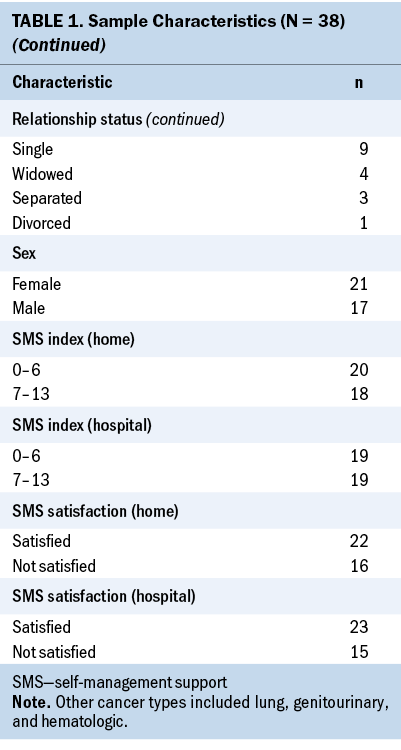
Preferred and Received Self-Management Support
Participants who reported congruence between preferred and received SMS in the hospital and at home are shown in Table 2. In the hospital and home setting, 19 participants reported congruence between preferred and received SMS from the HCP in developing self-confidence about managing pain. In the areas of HCPs acknowledging patients’ feelings and showing sympathy regarding pain, information about medication dosing, side effects, access and referral for alternative therapies, and insurance coverage for alternative therapies, a greater number of participants reported congruence between preferred and received SMS at home as compared to in the hospital. 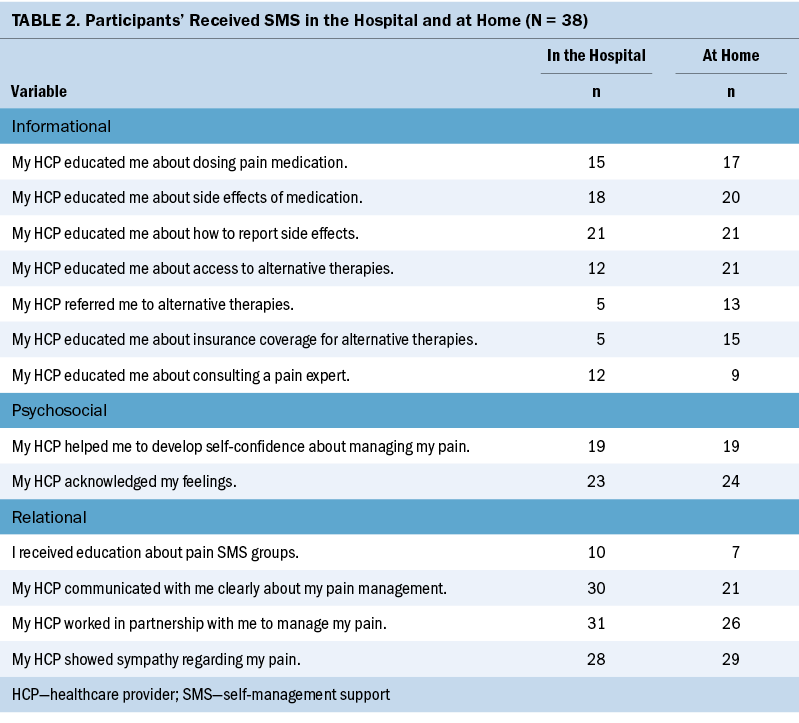
Cancer Pain
Table 3 presents the means and standard deviations for pain intensity and acceptable pain intensity as reported by participants in the hospital and at home. Mean pain intensity was slightly lower at home as compared to in the hospital. Mean pain scores were also lower (improved) in the hospital and at home as compared to acceptable scores in the hospital and at home. 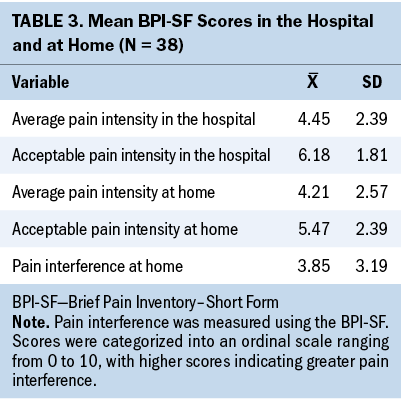
Transitional Change in Cancer Care
Means and standard deviations for the extent of change for each transition are shown in Table 4. The Cronbach’s alpha was 0.526 for extent of change and 0.856 for management of change. The small Cronbach’s alpha may be related to the small sample size. MOTCA scores were recoded as low (0–5) or high (6–10) to create a transition index score. Participants’ scores were categorized into groups that represented the extent of change and management of change. Most of the sample (n = 23) reported a high extent of change and good management of change. Seven participants reported a low extent of change and good management of change, and eight participants reported a high extent of change and poor management of change. 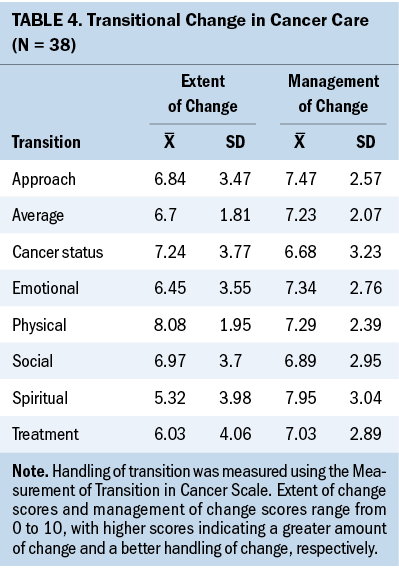
Relationships Among Self-Management Support, Transitional Change, and Pain Outcomes
Means and standard deviations for pain intensity in the hospital and home and pain interference at home were examined to determine the relationship with cancer pain SMS index scores, satisfaction with SMS, and transitional change. Identified relationships are shown in Table 5. 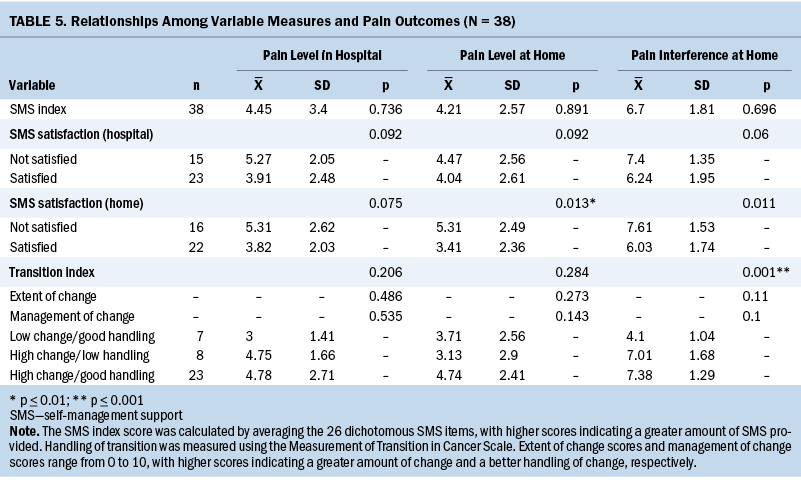
The relationship between average pain at home and ethnicity and satisfaction with SMS was significant (p = 0.029 and p = 0.013, respectively). Relationships between pain interference at home and phase of care (p = 0.032), satisfaction with SMS (p = 0.011), and transitional change (p = 0.001) were also identified. Although the congruence between preferred and received SMS was not significantly associated with pain intensity in the hospital or at home or with pain interference at home, other notable relationships were found. Satisfaction with SMS at home was significantly related to pain intensity (p = 0.013) and pain interference (p = 0.011) at home. In addition, transitional change was significantly related to pain interference at home (p = 0.001).
To further assess relationships among the variables of interest, a simple linear regression was used to determine the extent to which the congruence of cancer pain SMS (preferred and received) predicted pain intensity and interference, as well as whether the transition of care predicted pain intensity and interference. A linear regression determines the extent to which one independent variable predicts a dependent variable by indicating how well the line fits the data, with the slope of the regression line, the R value (or correlation), and the strength of the fit.
The first model tested the extent to which the congruence of preferred and received SMS (SMS index), extent of change, management of change, and use of alternative therapies predicted pain intensity in the hospital (F[4, 33] = 3.776, p = 0.012). Of the predictors assessed, only the extent of change was found to be a significant predictor of average pain in the time frame of the hospital (beta = 0.525, p = 0.002). An increase in the extent of change was associated with a 0.69-point increase in average pain in the hospital. Extent of change in the hospital explained 31% of average pain in the hospital (R2 = 0.314).
The second model tested the extent to which the SMS index, extent of change, management of change, and use of alternative therapies predicted pain intensity in the home (F[4, 33] = 3.229, p = 0.018). SMS index, transition index, and number of new alternative therapies did not show a statistically significant relationship with pain severity in the home. Satisfaction with SMS was the only significant predictor for average pain in the home (beta = –0.342, p = 0.03). Being unsatisfied with SMS was associated with a 1.755-point increase in pain. Satisfaction with SMS explained 34% of average pain in the home (R2 = 0.335).
The third linear regression model was fitted with average pain interference in the home as the outcome (F[4, 33] = 15.816, p = 0.000) and the SMS index, extent of change, and management of change as predictors. Only the extent of change was found to be a significant predictor of pain interference at home (beta = 0.741, p = 0.000). Extent of change was associated with a 3.257-point increase in pain interference in the home and explained 66% of pain interference in the home (R2 = 0.657).
Discussion
The current study was conducted to characterize pain SMS among patients with cancer during the transition of cancer care from the hospital to the home. The overarching hypothesis was that greater congruence between preferred and received cancer pain SMS would be associated with lower pain intensity. However, the results do not support this hypothesis and present a more complex picture of how the extent of change in cancer care in the hospital and home affects pain intensity and interference. Mean pain intensity scores were slightly lower in the home than at the hospital, and participants reported that they had a high extent of change, which they managed well. Inadequate SMS and a lack of satisfaction with SMS was also reported. Among participants who experienced cancer pain during the transition from the hospital to home, about half received the SMS they preferred in the hospital and at home, and a notable proportion were unsatisfied with SMS in both settings. Participants reported higher pain in the hospital (n = 13) and at home (n = 12) and greater dissatisfaction with SMS in the hospital (n = 15) and at home (n = 16). Although SMS was not significantly associated with pain intensity or interference, extent of change and satisfaction with SMS were significant predictors of pain outcomes in the hospital and at home. These results suggest many reasons for improving SMS during care transition from the hospital to home.
Similar to previous studies, more than 30% of participants in the current study reported high pain intensity (6–10 on a numeric rating scale) in the hospital and home setting (n = 13 and n = 12, respectively), and a significant proportion reported incongruence between their preferred and received cancer pain SMS (Schumacher et al., 1999). This incongruence may be because of the small sample size and lack of adequate power, the nature of the measures used, or poor management of the transition from the hospital to the home. Improving cancer pain SMS could decrease emergency department visits and hospital readmissions.
Consistent with previous findings, many participants in the current study reported dissatisfaction with cancer pain SMS in the hospital and home setting (Schumacher et al., 1999). Mean pain scores were lower (improved) compared to acceptable scores in the hospital and at home. These results could mean that participants did not receive enough support or that they chose to tolerate a higher amount of pain at home. Control, independence, and functioning at a level of one’s choosing are factors in the lived experience of cancer pain (Dunham et al., 2017; Gibbins et al., 2014). Taking less medication is a constant theme; patients are not willing to accept drowsiness and do not expect pain to go away completely (Dunham et al., 2017; Liang et al., 2008). Patients with a shortened life expectancy want to take an active role with the HCP, tailoring medication to their preferences (Sand et al., 2009).
The extent of change during the transition of care was a significant predictor of pain intensity in the hospital and pain interference at home. This is an important finding that should be considered in the planning of cancer pain SMS and identification of patients at risk for poor pain outcomes. Patients who received discharge with supportive care interventions were more likely to receive support at home (Scott et al., 2020). Not receiving such support translates to increases in costs, emergency department visits, hospital readmissions, lost work by patients, decreased quality of life, and physical suffering (McIlvennan et al., 2015). Coordinated transition of care processes are needed to ensure optimal care for patients. The results of this study show that transitions of care affect pain outcomes and suggest that further research on the influence of care transitions on outcomes is warranted. The effects of nursing interventions on cancer pain also need to be evaluated in relation to other patient outcome indicators at each phase of the care continuum across care transition points.
Despite the small sample size, the results inform the potential for interventions aimed at aligning congruence between preferred and received cancer pain SMS and improving pain outcomes. Considering the extent of change, satisfaction with cancer pain SMS, and treatment throughout survivorship will require the development of comprehensive instruments that simultaneously measure cancer pain intensity, self-management, and extent of change in clinical practice. Differences in cancer pain outcomes have been documented (Gunnarsdottir et al., 2002) similar to the current study, which demonstrated substantial variation in many components of preferred and received pain SMS between the hospital and home settings. Although some variation may be expected because of differing needs across transitions in care, a higher level of congruence was anticipated with increased attention regarding the importance of transitions of care. For example, less than 60% of the sample reported adequate informational support in the hospital and at home regarding dosing of pain medication (n = 15 in hospital and n = 17 at home), side effects (n = 18 in hospital and n = 20 at home), and access to alternative treatments (n = 12 in hospital and n = 21 at home).
In a cluster-randomized multicenter trial to evaluate a nurse-led intervention in improving pain outcomes, a multimodular structured intervention was used to reduce patient barriers to self-management of cancer pain (Jahn et al., 2014). Participants randomized to the intervention received patient education, skills training, and counseling performed by oncology nurses from the time of admission, with booster sessions every third day of the hospital stay specific to cancer pain self-management, including a follow-up telephone counseling session within two to three days after discharge. In addition to reducing patient barriers, medication adherence was significantly improved in the intervention group, and the intervention led to a significant reduction in average and worst pain intensity and improved quality of life (Jahn et al., 2014). The results of the current study support the need for implementation of such interventions in clinical practice, particularly to address the needs and preferences for cancer pain SMS in the hospital and during the transition to home. The current study informs specific areas that may be incorporated into such interventions, including medication dosing, side effects, alternative therapy options, referral, and insurance coverage.
Limitations
There are several limitations of the study that must be considered when interpreting the results. Because of the cross-sectional design, directionality of the identified associations or cause-and-effect relationships cannot be assumed. Considering the identified significance of relationships among cancer pain SMS, care transitions, and pain intensity and interference, a longitudinal investigation is warranted. Longitudinal studies of care transition measures would be valuable in understanding how cancer pain SMS varies across time and its influence on other cancer pain self-management behaviors. Qualitative studies would assist in augmenting the current study’s results. Patient responses to cancer pain interventions designed to enhance SMS could also help determine intervention efforts that are most effective.
The sample of the current study was homogeneous in race, marital status, and educational attainment, and may not be generalizable to other patient populations. In addition, the sample was small, with the study recruitment limited to one geographic region and healthcare system, which may limit generalizability to other cancer populations. Therefore, future studies should focus on enrollment of more diverse populations. Additional barriers to receiving cancer pain SMS and differences in cancer pain and other outcomes have been documented (Campbell & Edwards, 2012). Variations in the type and stage of cancer may result in different experiences of cancer pain (nerve or bone pain versus postoperative pain), which may influence transitions in care and SMS. Although the current study provides a solid first step, more in-depth focus on populations with a specific cancer type, disease stage, and cancer pain could advance mechanism-driven cancer pain self-management or SMS interventions.
Finally, the study was conducted during the COVID-19 pandemic, and restrictions on visitors limited the involvement of caregivers during discharge or transition. Although many participants experienced the transition from the hospital to the home prior to the pandemic, the results may be biased because of the healthcare climate at time of the survey.
Implications for Nursing
The results of this study bring greater understanding of patients’ preferences and needs for improved cancer pain SMS during care transitions. The ability to tolerate a higher level of pain interference as acceptable and a greater extent of transitional change at home suggests that it should be examined whether current outcomes are meaningful to patients when considering the quality of their transitions. Knowledge of needs and preferences and transitional change may contribute to the development of interventions that anticipate patient vulnerability. Specific areas that may be incorporated into an intervention are medication dosing, side effects, and information about and referral to alternative options.
Adopting transition of care processes that coordinate care will ensure optimal cancer care. Readmissions for pain treatment can be avoided if continuity of care is planned more carefully during transitions of care and if more patient-reported outcomes are incorporated and standardized to improve transitions and postdischarge outcomes. Screening tools to initiate inpatient, pain management consultations, patient education materials, provider training or checklists, and patient follow-up calls should be used to assess for unmet support needs and preferences during transitions of care. 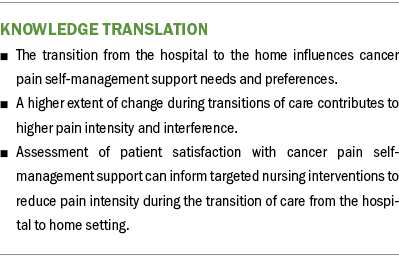
Conclusion
By having a greater understanding of patients’ experiences, cancer care can be improved, and pain self-management research can be advanced. HCPs can improve assessments and incorporate care planning that anticipates transitions in cancer pain self-management, which can help to avoid costly readmissions for pain treatment. The results of the current study may contribute to the development of appropriate interventions based on patients’ SMS needs and preferences that anticipate periods of vulnerability.
About the Author(s)
Alice Jane Anderson, BA, BSN, MSN, OCN®, PhD, is a graduate student in the School of Nursing, Angela Starkweather, PhD, ACNP-BC, CNRN, is a professor in the School of Nursing and associate dean for academic affairs, Xiaomei Cong, PhD, RN, FAAN, is a professor and associate dean for research in the School of Nursing, Wanli Xu, PhD, RN, is an assistant professor in the School of Nursing and assistant director of the biobehavioral research laboratory, and Michelle P. Judge, PhD, RD, CD-N, is an associate professor in the School of Nursing, all at the University of Connecticut in Storrs; Dena Schulman-Green, PhD, is an associate professor in the Rory Meyers College of Nursing at New York University in New York; Yiming Zhang, MS, is a graduate assistant in the Department of Statistics at the University of Connecticut; Andrew L. Salner, MD, is the medical director at the Hartford Healthcare Cancer Institute at Hartford Hospital in Connecticut; and Ellen A. Dornelas, PhD, is a psychologist at Hartford Healthcare. Anderson received funding from an Oncology Nursing Foundation dissertation grant from Genentech. Anderson, Starkweather, Cong, Xu, Judge, Schulman-Green, Salner, and Dornelas contributed to the conceptualization and design. Anderson, Starkweather, Salner, and Dornelas completed the data collection. Anderson, Starkweather, Cong, and Zhang provided statistical support. Anderson, Starkweather, Cong, Schulman-Green, Salner, and Dornelas provided the analysis. Anderson, Starkweather, Cong, Xu, Judge, and Schulman-Green contributed to the manuscript preparation. Anderson can be reached at aliceanderson7854@gmail.com, with copy to ONFEditor@ons.org. (Submitted April 2021. Accepted July 7, 2021.)

